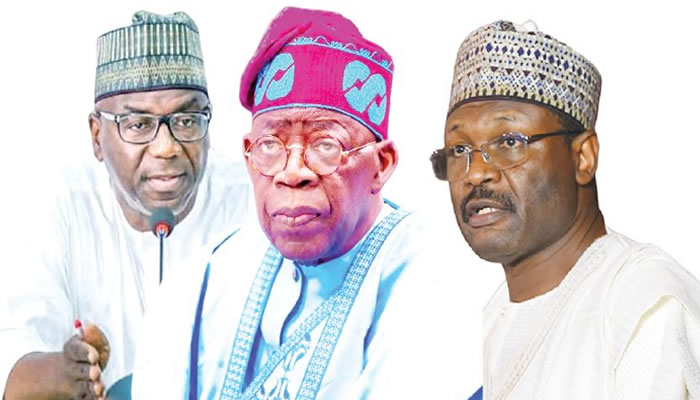
The recent local government election in Edo State where the governing Peoples Democratic Party won in all 18 councils again brings to the fore the need to make democracy work at the grass roots, DIRISU YAKUBU writes on the need for governors to loosen their grip on local governments for them to perform their constitutional roles
As the closest tier of government to the grass root, the local government system has not lived up to the expectation of Nigerians as it concerns grass roots development. As a result, rural-urban migration has continued to be on the rise over the years.
Since the return to democracy in 1999, successive administrations have paid lip service to the calls for a robust democratic administration at the local government level. Progressively, the role of local government councils has been rendered inconsequential owing to the overbearing attitude of state governors who treat the third tier as personal fiefdoms.
According to the Fourth Schedule of the 1999 Constitution (as amended), the main functions of a local government council include the consideration and the making of recommendations to state commission on economic planning or any similar body on “The economic development of the state, particularly in so far as the areas of authority of the council and of the state are affected, and proposals made by the said commission or body; collection of rates, radio and television licenses; establishment and maintenance of cemeteries, burial grounds and homes for the destitute or infirm; licensing of bicycles, trucks (other than mechanically propelled trucks), canoes, wheelbarrows and carts; establishment, maintenance and regulation of slaughter houses, slaughter slabs, markets, motor parks and public conveniences; construction and maintenance of roads, streets, street lightings, drains and other public highways, parks, gardens, open spaces, or such public facilities as may be prescribed from time to time by the House of Assembly of a state.”
Others include “The naming of roads and streets and numbering of houses; provision and maintenance of public conveniences, sewage and refuse disposal; registration of all births, deaths and marriages; assessment of privately owned houses or tenements for the purpose of levying such rates as may be prescribed by the House of Assembly of a state; and control and regulation of outdoor advertising and hoarding, movement and keeping of pets of all description” amongst others.
Given the tight grip on local government councils by governors, most of the functions above have been usurped by the states, while the funds that could have been used by the leadership of the local governments have been brazenly diverted by some of the governors. At the moment, most local governments exist as a shadow of what an autonomous tier of government should be.
Across many states, local governments do not have elected chairmen or councillors, as governors are wont to appoint caretaker committee members, in flagrant disobedience to the constitution. Sadly too, whether the LG chairmen are appointed or elected, they mostly do the bidding of the governor.
Meanwhile, in states where local government elections have been held, there has been a practice of the governing party recording a landslide in the elections. Analysts have argued that apart from suppressing opposition parties, many governors use the state Independent Electoral Commission, which they constitute, to have their way. Thus, the party in power often wins all the seats.
The recent local government election in Edo State provides a good point of reference. Governor Godwin Obaseki’s popularity was put to the test in the 2023 general election. A close ally of the Peoples Democratic Party’s presidential candidate, Atiku Abubakar, the governor campaigned vigorously for the party for the various elective positions. With governorship polls due in 2024, he had the latitude to campaign for others without the distraction or the pressure of returning to Osadebe Avenue.
However, while the PDP lost to the Labour Party in the presidential election and lost the three senatorial seats, as APC won two seats and LP won one, the PDP won all the chairmanship and councillorship seats.
Just as the party failed to win any senatorial seat, the story was not different in the House of Representatives, where the APC won seven seats while the Labour Party won two.
Interestingly, Edo is not alone in this; in almost every state where local government has held, the party in power wins all the seats, even when they lose in national elections. Expectedly too, opposition parties’ allegations of voter suppression and harassment, result manipulation and other irregularities have become commonplace.
An APC councillorship candidate for Ward 9, Etsako East Local Government Area, Usman Igbasekhe, narrated his ordeal, saying, “Edo State conducted local government election on September 2. Before then, Governor Obaseki assured all political parties that he would conduct a free and fair election, free of irregularities.
“We believed in these words and went about our campaigns. On the day of the election, we were shocked to realise that the SIEC brought only 100 ballot papers to each of the polling units. In faith, we accepted this and agreed to carry on, believing that whoever was destined to win would win despite the short supply of election materials.
“In Etsako East, we have 17 polling units, making a total of 1, 700 ballot papers. We didn’t get materials on time until a few minutes before 1 pm. Election was conducted free and fair; no violence. After this, results were declared at every polling unit. APC won in 15 polling units out of the 17. From the polling units, results were sent to the ward collation centre, where the Presiding Officer refused to declare the winner.
Igbasekhe said the presiding officer told them there was no result sheet to collate the results to enable him to declare a winner. He said when they resisted and insisted that he ought to declare the result, he ran away from the collation centre.
He added, “The next day, the results from Ward 9 and other results were taken to Agenebode, headquarters of Etsako East Local Government Area. At the EDSIEC office in Agenebode, results were declared, only for us to get another information that the EDSIEC commissioner was also declaring results in Benin, where all the PDP candidates were declared winners.
“That was how a certificate of return was issued to Abdulsalim Afoso, the candidate of the PDP. We are asking that the right thing should be done.”
Speaking on the fixation of governors on local government councils, public affairs analysts, Jide Ojo said, “The third tier of government has been successfully pocketed by the state governors. I have also had cause to argue that we either reform local government administration or we scrap it. If we are not ready to have a full tier of government, then let’s not have it. If we want local governments to be the responsibility of the states, let us remove those listed in the constitution and make them subject to state control.
“State governments don’t fund their electoral commissions very well. In some occasions, they sacked the management of the State Electoral Commission, particularly if a new administration comes into power and it was not the one that inaugurated those commissions.”
Speaking on the way out, he stated, “In 2009, part of the Uwais Commission report was for the State Electoral Commission to be integrated into INEC, but even INEC itself is also suffering from executive interference. What we need is local government autonomy and that autonomy should start from having the State Independent Electoral Commission on the first line charge of the consolidated revenue fund of the state. When they are well funded, they won’t be at the beck and call of the governors. They won’t be listening to the dictates of the governors if they are well funded.
“In some states, there has been no local government election in 10 years. There has been no regular election in Anambra. In Borno State, maybe because of insecurity, they have not had elections. Only Lagos has been up to date and has four-year tenure for their local governments.
“As for the ruling party in the state winning all the seats, opposition parties sometimes boycott the elections, believing that nothing good will come from them.”
Also, the National Publicity Secretary of the Young Progressives Party, Wale Egbeola-Martins, argued that the way governors have handled local governments is dangerous to democracy.
He added, “The danger is grave and that is why development has eluded us as a country. Development anywhere in the world is from bottom-up and local governments are at the heart of driving grassroots development. In developed climes, local governments are responsible for basic infrastructure such as roads, schools, housing, among others.
“However, what we have in Nigeria is that governors have pocketed the local governments, depriving them of legitimacy. The local governments are only accountable to the governors and not the people, which has made it increasingly difficult for development to take place at that level. No wonder, allocations meant for that tier of government are controlled by the governors who determine how it is spent, with most of it unaccounted for.
“Until transparent elections are conducted at the local government levels by a truly independent electoral umpire, devoid of the interference of governors, stooges and charlatans rather than elected representatives of the people will continue to emerge as chairmen, thereby promoting mediocrity, lack of innovation and underdevelopment at that level.”
Also, a chieftain of the Arewa Consultative Forum, Anthony Sani, blamed the State Electoral Commissions for helping governors to stifle the opposition at the grass roots level.
He stated, “The danger in the attitude of governors to local government councils, in which case the governing parties win all the elections at the local government level, is that it is killing democracy at that level. As a result, democracy has not flourished at that level of governance, which in turn has affected effective governance.
“The underlying causes are the State Electoral Commissions which are compromised by state governors and made to kill any opposition parties at that level. The way out is to expunge from the constitution State Independent Electoral Commissions and let INEC conduct all elections, including local government elections. That way, the governors’ capacity to make local government councils their political poodles would be curtailed and the councils would be made accountable to the people and not the governors.
“You may wish to note that the way governors manipulate State Independence Electoral Commissions and make it impossible for opposition parties to win even a councillorship seat has contributed in no small measure to most Nigerians’ opposition to state police, which many have said could be abused by governors, thus creating more problems for the country,” he said.
According to the Executive Director, Human and Environmental Development Agenda, Suraju Olanrewaju, governors are solely to blame for the fading democracy at the grass roots.
He stated, “The majority of governors have consistently eroded governance at their states and local governments. You can hardly boast of any independent and effective House of Assembly in any of the states because the governors operate empires in their states and they are emperors.
“While civil society organisations advocate for the devolution of power to states in observance of genuine federalism, we are constrained by governors’ penchant for abuse and misuse of the power. The absence of governance and development at the local level and exacerbation of poverty is mainly traced to our governors and their greed for power and money.
“They are intolerant of opposition occupying local government offices because their diversion of local government funds and usurpation of its functions are threatened with opposition in the mix. This has crippled the local government in its provision of primary health care, education, development, governance and democracy.”





